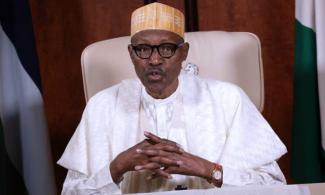
Speaking on behalf of Buhari, Garba Shehu said: ”It is instructive that President Buhari clearly won this vote and the report in no way disputes that fundamental fact. President Buhari won by almost four million majority, with a 14 percent margin."

President Muhammadu Buhari has expressed reservations towards the report of the International Republic Institute (IRI) and the National Democratic Institute (NDI) on the 2019 general elections in Nigeria and their recommendations for the 2023 general elections.
Speaking on behalf of Buhari, Garba Shehu, the President’s Senior Special Assistant on Media and Publicity, said in a statement: ”It is instructive that President Buhari clearly won this vote and the report in no way disputes that fundamental fact. President Buhari won by almost four million majority, with a 14 percent margin."
Arguing further, he claimed: ”However, the most important thing in an election is that it reflects the will of the people which in our circumstances was acknowledged to have been a success by ECOWAS Observer Mission and YIAGA AFRICA whose parallel vote tabulation verified INEC’s presidential election result as announced. This we achieved.”
He also gave reasons for the low turnout of voters during the presidential elections saying: ”They also posed a problem for electoral observers: across a country of over 190 million, only 40 observers were deployed to observe just 16 states including the Federal Capital Territory. It was unfortunate that the election was postponed yet imagine if the Independent National Electoral Commission (INEC) had gone ahead unprepared. The delay undoubtedly resulted in a lower turnout.
”Because they are registered to vote in their place of birth, and not where they live, many Nigerians could not make arrangements to travel back again. But the fact still remains that major democracies of the world have equally recorded worst turnout in modern history.
”The effect of voter turnout, at any rate, is a two-way traffic that affected both sides equally. To pretend otherwise is wrong considering that in 2015, the INEC postponed the election by six weeks under a PDP president, whom – as an incumbent – it was said to help at the time.
”It didn’t make a difference. Similarly, neither did it aid the sitting president in 2019,” he said.
Shehu also said it was "amazing" that the observers recommended that electoral laws were enforced, and perpetrators of crimes punished ”and at the same time implicitly criticize the removal of the chief justice of Nigeria for failing to disclose his assets as required by law. Which would they prefer?
”The law is a matter of principle that takes its course regardless of time and circumstances. It is never a matter of convenience and indeed remains functional, operational and enforceable without due regard to the electioneering process. As we have already said, we are committed to reviewing our electoral laws and processes, like every democracy across the world, should.”
Continuing, he said: ”This election was won by the candidate who received the most votes. We value the report’s recommendations. We can assure they shall be assessed and evaluated.”